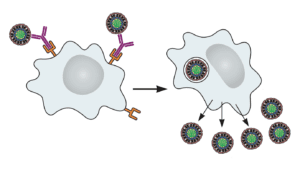

Earlier this year (virology blog link) it was shown that antibodies to dengue virus – in the form of serum from infected patients, or two human monoclonal antibodies – bind to Zika virus and can enhance infection of Fc-receptor bearing cells (Fc receptors bind the antibody molecule, allowing uptake into cells – illustrated). When the antibodies to dengue virus were omitted, Zika virus barely infected these cells. The conclusion is that dengue antibodies enhance infection of cells in culture by Zika virus.
This early work was first published as a preprint on the bioRxiv server – which lead some to criticize me for discussing the work before peer review. However, I subjected the paper to my own peer review, of which I am entirely capable, and decided it was worthy of discussion on this blog.
The results have now been confirmed by an independent group (paper link). Sera from patients that were infected with dengue virus, as well as dengue virus specific human monoclonal antibodies, were shown to bind Zika virus and enhance infection of Fc receptor bearing cells. These are the same findings of the group who first published on bioRxiv. That paper still has not been published – apparently it is mired in peer review, with many new experiments requested. I do hope that none of the authors of the second paper are involved in delaying its publication – something that happens all too often in science. As a colleague once remarked, ‘the main function of peer review is to prevent your competitors from publishing their work’.
Whether or not antibodies to dengue virus enhance Zika virus disease in humans is an important unanswered question.
If you are wondering whether antibodies to Zika virus can enhance dengue virus infection, the answer is yes (paper link). Monoclonal antibodies were isolated from four Zika virus-infected patients, and shown to enhance infection of Fc receptor bearing cells with either Zika virus or dengue virus. Furthermore, administration of these antibodies to mice before infection with dengue virus led to severe disease and lethality, a demonstration of antibody-dependent enhancement in an animal model.
Of interest is the finding that ADE mediated lethality in this mouse model can be completely prevented by co-administering the same antibody that has been modified to block binding to Fc receptors on cells. This result suggests a modality for treating patients with enhanced disease caused by either dengue virus or Zika virus.
These observations suggest that we need to be careful when deploying vaccines against Zika virus or dengue virus – it is possible that the antibody response could enhance disease. Recently a dengue virus vaccine called Dengvaxxia was approved for use in Brazil, Mexico, and the Philippines. However, the vaccine is not licensed for use in children less than 9 years of age because in clinical trials, immunization lead to more severe disease after infection compared with non-immunized controls. Analysis of the clinical trial data (paper link) indicates that seronegative individuals of all ages were at increased risk for developing severe disease that requires hospitalization. The authors suggest that severe disease is a consequence of enhancement of infection caused by antibodies induced by the vaccine (see CIDRAP article for more information).
These observations lead to the question of whether immunization against dengue and Zika viruses might enhance disease caused by either virus. Could a solution to this potential problem be to use a vaccine that combines the four serotypes of dengue virus with Zika virus? If so, the dengue virus component should not be Dengvaxia, but possibly another vaccine (e.g. TV003 – virology blog link) that does not induce disease enhancing antibodies.

Pingback: Genomic epidemiology to combat virus outbreaks | The STEM Lab and Field Blog